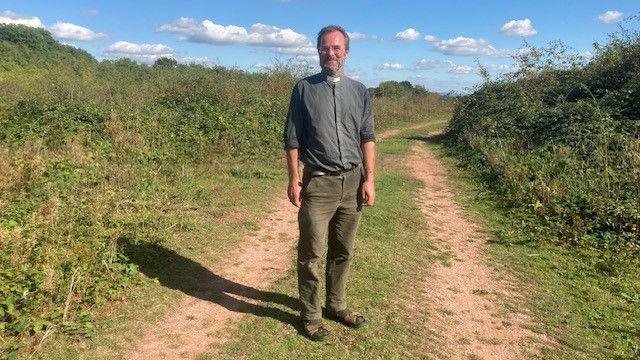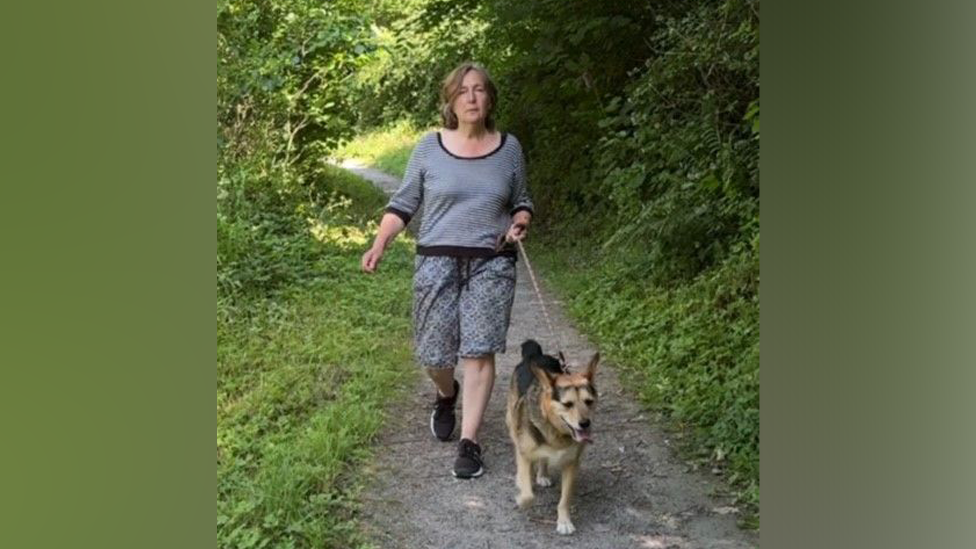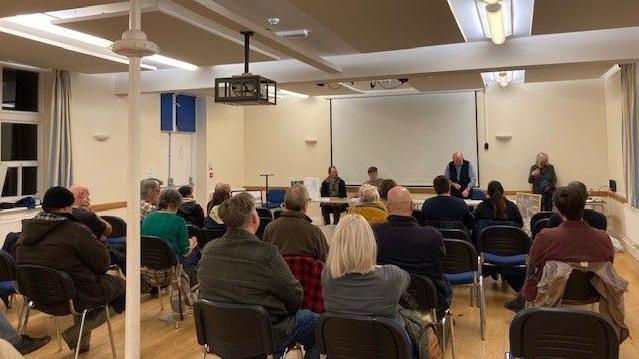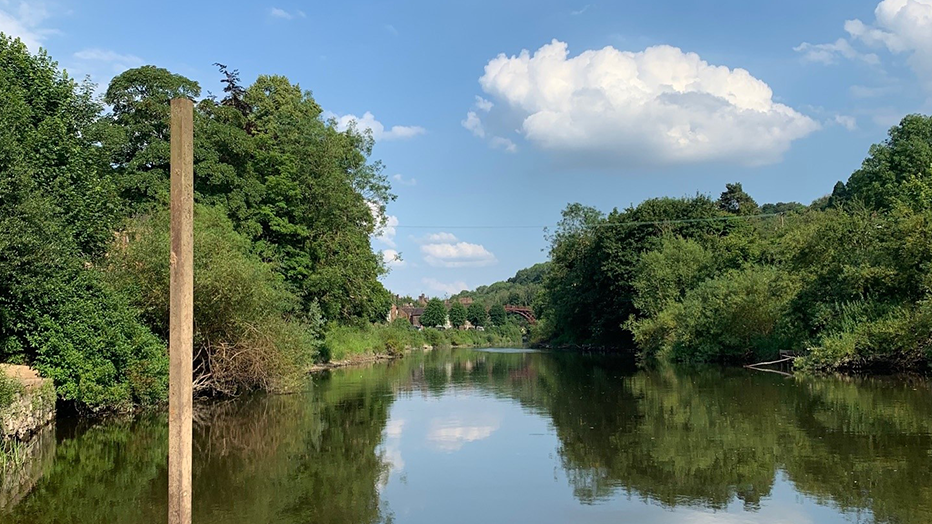Calls for transparency after toxic waste fears
Listen on BBC Sounds: People are concerned that water near Stoneyhill could be contaminated
- Published
Campaigners fearful of toxic waste leaking from a former landfill site have called on the council to publish the results of monitoring tests.
Stoneyhill, near Telford, was used by the former international chemical company Monsanto between 1985 and 1991.
Vicar turned citizen scientist Paul Cawthorne has called for transparency and "more accountability" over testing at the site.
Telford and Wrekin Council said it was not contaminated land and while regular testing took place throughout the year, none of the results gave "cause for concern".
However, it has refused to release its results to either the BBC or campaigners.
Monsanto ceased trading in 2016, but tests done on another of the firm's former sites found levels of now-banned chemicals more than 12,000 times higher than the recommended UK levels.

Reverend Paul Cawthorne has been checking former Monsanto sites across the UK
A stream runs through the former landfill at Stoneyhill and down into Coalbrookdale and on into the River Severn.
The soil and water in the stream is bright orange, but both the Environment Agency and Telford and Wrekin Council say it is caused by iron contamination from former mines that litter the area.
"For years I’ve been asking for the results of tests done here to be made public," Mr Cawthorne said.
"Hopefully there’s nothing here but when people withhold results, then you wonder what they’re trying to hide."
The former landfill was used to dispose of industrial, commercial and household waste, as well as animal carcasses.
Monsanto used it to bury industrial waste from their factories in South Wales.
Campaigners' fears have been prompted by the use of so-called "forever chemicals" used in paint and other household products at the time.
In high doses, Polychlorinated Biphenyls (PCBs) and Polyfluorinated Alkyl Substances (PFAs) have been linked to serious health concerns, external including cancer and fertility issues.
They are now banned by 151 countries.

Pat McCarthy is concerned about the impact of toxins on human health
Pat McCarthy, the Green Party co-ordinator for the area, said: "The worry is we’re talking about chemicals that live forever in the environment.
"We already know that they can damage organs within the body.
"We will find out, I'm absolutely certain, that the accumulation of these chemicals will have serious consequences.
"All we want is for the authorities to test regularly and show us the results. If there’s nothing there we've got nothing to worry about."

Sarah Robinson's dog Dylan became ill after drinking water from a brook
Local resident Sarah Robinson said her dog Dylan became ill after drinking the water at Coalbrookdale.
"He drank from the water as it was coming down from the stream and he was sick with diarrhoea, severe diarrhoea for 24 hours. We were very worried about him," she said.
"It’s been like this since my childhood. It’s been cleaned out from time to time and after that the water does get cleaner.
"It’s really concerning. I don’t let Dylan go near the water any more."
'No cause for concern'
The BBC submitted a freedom of information request to Telford and Wrekin Council, which confirmed it monitored the site regularly, including for PCBs and PFAs.
It refused to release its data, but in a statement said: "Continuous monitoring and regular testing takes place throughout the year, both on site and beyond as part of the active management of the site.
"Of all the testing results collated to date, none has presented any cause for concern.
"We have been completely open about how we manage the site including what and how we test."

Dozens of people attended a public meeting about Stoneyhill last year
The local authority owns the site, although it belonged to Shropshire County Council at the time it was in active use.
The Environment Agency (EA) has found very low levels of toxic chemicals in a ditch near Stoneyhill, but said it also has no cause for concern.
It also tested nearby streams in 2017 and 2018 and said the water quality was good, but those tests did not include ones for forever chemicals.
As part of a BBC investigation into forever chemicals, the Royal Society of Chemistry tested land near other former Monsanto sites.
On a public path at Helsby in Cheshire, a scientist found the highest level of the banned chemical he had ever recorded in soil anywhere in the world.
The sample of mud contained PCBs more than 12,000 times over the recommended UK level and was off the maximum scale of calibration for the equipment.
Despite that, the local authority has not registered the former landfill site as "contaminated land".
Further tests at former Monsanto sites in South Wales returned levels between four and 150 times higher than the UK background level of PCBs.

The Ironbridge Gorge is a Unesco World Heritage site, listed alongside the likes of the pyramids of Giza and the Great Wall of China
Regarding the situation at Stoneyhill, the EA said it "supports local authorities to identify and investigate contaminated sites where appropriate and they'll work with appropriate persons to reduce unacceptable risks to human health and the environment."
The water is then treated before being discharged into the river. Severn Trent’s permit does not require the company to test for forever chemicals.
The water company said: "The limits we set are there to ensure that there is no harm to the environment and to ensure that our treatment processes can effectively treat waste in accordance with the environmental permits."
Ironbridge is worth millions of pounds to the Midlands economy - campaigners say they just want proof that its industrial heritage is not leaving a harmful legacy.
Follow BBC Shropshire on Facebook, external, X, external and Instagram, external. Send your story ideas to: newsonline.westmidlands@bbc.co.uk, external